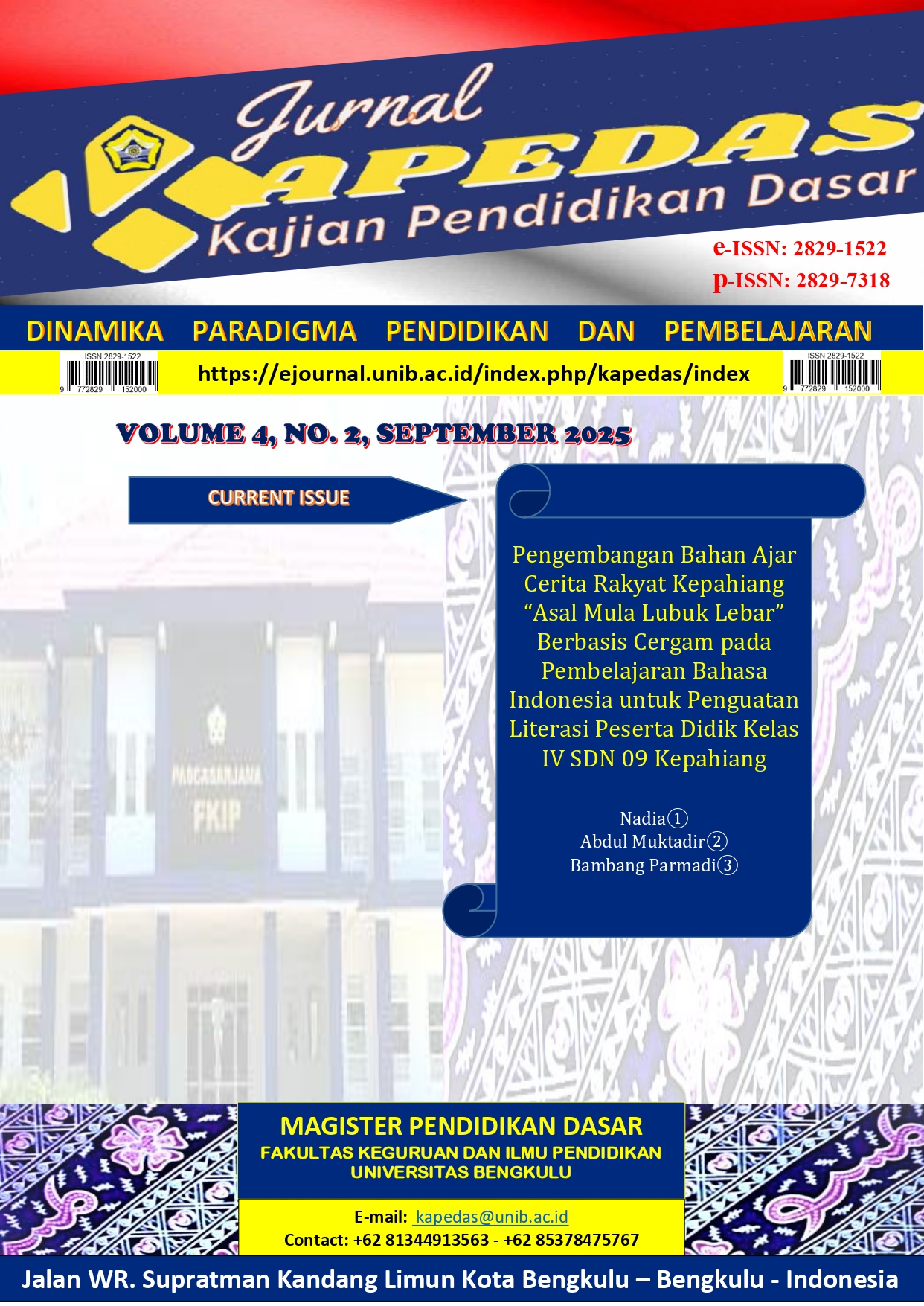Main Article Content
Abstract
This research aims to develop a Student Worksheet (LKPD) based on the Problem-Based Learning (PBL) model to enhance cognitive learning outcomes and the cooperative character profile in Pancasila education subjects at the elementary school level. The type of research utilized is Research and Development (R&D) with the ADDIE development model, comprising five stages: analysis, design, development, implementation, and evaluation. The types of data used are quantitative and qualitative, with quantitative data derived from scoring questionnaires provided by validators, while qualitative data are critiques and suggestions from expert validation. Based on the research findings, the pretest and posttest scores indicated improvement, with the average pretest score of 57.2 and the average posttest score of 84.8. Additionally, the N-Gain Score test results revealed an average score of 76.60, categorized as high. Therefore, the LKPD based on the PBL model is suitable as teaching material to improve cognitive learning outcomes and cooperative character profiles, with the results showing appreciation at 93.74%, mutual assistance at 90.62%, and empathy at 92.84%.
Article Details
Copyright (c) 2025 Dhea Putri Awdiani, Osa Juarsa, Endang Widi Winarni

This work is licensed under a Creative Commons Attribution-ShareAlike 4.0 International License.

Karya ini dilisensikan di bawah Creative Commons Attribution-ShareAlike 4.0 International License .
References
- BSNP. (2016). Standar Nasional Pendidikan Buku Pelajaran Sekolah Dasar. Badan Standar Nasional Pendidikan.
- Daryanto. (2021). Media Pembelajaran: Peranannya dalam Meningkatkan Hasil Belajar. Yogyakarta: Gava Media.
- Dewi, A., Wahyuni, R., & Sari, R. (2022). Aspek Menghargai dalam Pembelajaran Pendidikan Pancasila. Jurnal Pendidikan Pancasila, 12(1), 45–52.
- Kurniawati, E. (2021). Gotong royong sebagai bentuk solidaritas sosial di era globalisasi. Jurnal Pendidikan Karakter, 10(2), 123–135.
- Maisaroh, N. (2024). Kepraktisan E-LKPD Berbasis PBL dalam Meningkatkan Hasil Belajar Siswa. Jurnal Teknologi Pendidikan, 16(1), 35–42.
- Permendikbud Nomor 22 Tahun 2008. (2008). Standar Mutu Buku Pelajaran. Jakarta: Kementerian Pendidikan dan Kebudayaan.
- Permendikbudristek No. 8 Tahun 2024. (2024). Tentang Ruang Lingkup Materi Pendidikan Pancasila.
- Permendikbudristek No. 32 Tahun 2024. (2024). Tentang Tujuan Mata Pelajaran Pendidikan Pancasila.
- Salamun, H. (2023). Analisis Model Pembelajaran Problem Based Learning. Jurnal Ilmiah Pendidikan dan Pembelajaran, 9(3), 55–60.
- Schmidt, H. G., Loyens, S. M., van Gog, T., & Paas, F. (2021). Problem-based learning is compatible with human cognitive architecture: Commentary on Kirschner, Sweller, and Clark (2006). Educational Psychologist, 42(2), 91–97.
- Sujana, A. (2020). Karakteristik Model Pembelajaran Berbasis Masalah. Jurnal Pendidikan dan Penelitian, 15(2), 129–130.
- Syamsidah, & Suryani, F. (2018). Pengaruh Model Problem Based Learning dalam Meningkatkan Keterampilan Berpikir Kritis Siswa. Jurnal Pendidikan Dasar, 14(1), 8–10.
- Undang-Undang No. 14 Tahun 2005. (2005). Tentang Guru dan Dosen.
- Wardani, S. (2024). Pengembangan LKPD Berbasis PBL untuk Meningkatkan Pemecahan Masalah Siswa. Jurnal Inovasi Pendidikan, 13(3), 56–60.
- Zulaiha, L. (2023). Tantangan Implementasi Kurikulum Merdeka: Kajian Analisis Pembelajaran. Jurnal Kurikulum dan Pembelajaran, 15(4), 37–45.
References
BSNP. (2016). Standar Nasional Pendidikan Buku Pelajaran Sekolah Dasar. Badan Standar Nasional Pendidikan.
Daryanto. (2021). Media Pembelajaran: Peranannya dalam Meningkatkan Hasil Belajar. Yogyakarta: Gava Media.
Dewi, A., Wahyuni, R., & Sari, R. (2022). Aspek Menghargai dalam Pembelajaran Pendidikan Pancasila. Jurnal Pendidikan Pancasila, 12(1), 45–52.
Kurniawati, E. (2021). Gotong royong sebagai bentuk solidaritas sosial di era globalisasi. Jurnal Pendidikan Karakter, 10(2), 123–135.
Maisaroh, N. (2024). Kepraktisan E-LKPD Berbasis PBL dalam Meningkatkan Hasil Belajar Siswa. Jurnal Teknologi Pendidikan, 16(1), 35–42.
Permendikbud Nomor 22 Tahun 2008. (2008). Standar Mutu Buku Pelajaran. Jakarta: Kementerian Pendidikan dan Kebudayaan.
Permendikbudristek No. 8 Tahun 2024. (2024). Tentang Ruang Lingkup Materi Pendidikan Pancasila.
Permendikbudristek No. 32 Tahun 2024. (2024). Tentang Tujuan Mata Pelajaran Pendidikan Pancasila.
Salamun, H. (2023). Analisis Model Pembelajaran Problem Based Learning. Jurnal Ilmiah Pendidikan dan Pembelajaran, 9(3), 55–60.
Schmidt, H. G., Loyens, S. M., van Gog, T., & Paas, F. (2021). Problem-based learning is compatible with human cognitive architecture: Commentary on Kirschner, Sweller, and Clark (2006). Educational Psychologist, 42(2), 91–97.
Sujana, A. (2020). Karakteristik Model Pembelajaran Berbasis Masalah. Jurnal Pendidikan dan Penelitian, 15(2), 129–130.
Syamsidah, & Suryani, F. (2018). Pengaruh Model Problem Based Learning dalam Meningkatkan Keterampilan Berpikir Kritis Siswa. Jurnal Pendidikan Dasar, 14(1), 8–10.
Undang-Undang No. 14 Tahun 2005. (2005). Tentang Guru dan Dosen.
Wardani, S. (2024). Pengembangan LKPD Berbasis PBL untuk Meningkatkan Pemecahan Masalah Siswa. Jurnal Inovasi Pendidikan, 13(3), 56–60.
Zulaiha, L. (2023). Tantangan Implementasi Kurikulum Merdeka: Kajian Analisis Pembelajaran. Jurnal Kurikulum dan Pembelajaran, 15(4), 37–45.
